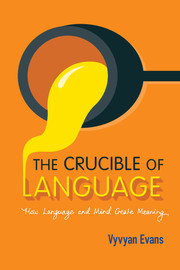Epilogue: The golden triangle
Published online by Cambridge University Press: 05 November 2015
Summary
In this book, I've focused on the relationship between language and mind in creating meaning. I've argued that meaning arises in the mix, from the complex interplay of analogue knowledge in the mind's conceptual system and the parametric knowledge embedded in the grammatical system of a language. But there's a third factor that contributes just as significantly to meaning: namely, culture. Daniel Everett, an anthropological linguist and one of the world's leading authorities on the relationship between language and culture, has observed that, in certain respects, language itself appears to be a cultural invention. For Everett, language is a tool, moulded and honed by culture, in order to facilitate the shared values and ideas that form the backdrop to the collective lives of the individual members of any given community. And just as language is, in part, shaped by culture, so too are the concepts that it helps express: ‘Living in a culture and acquiring cultural knowledge enables us to gain meaning from the world around us and from each other’. Hence, no account of the unprecedented capacity exhibited by our species to create meaning would, or could, be complete without considering the role of culture in giving rise to meaning.
A moment's reflection reveals that language is a repository of cultural knowledge, one that captures and provides effective cues to a complex body of shared values, experiences and even a common past. For instance, Everett discusses the use of the word Dickensian in the following utterance: The living conditions were Dickensian. The word itself amounts to a label – a shorthand cue – pointing to a complex body of knowledge shared by all literate native speakers of English. It evokes the inequality and moral decrepitude of aspects of Victorian England: the poor sanitation, overcrowding, and the misery of the have-nots compared to their lords and masters, as brilliantly captured in the didactic works of Charles Dickens. The word itself neatly ‘packages’ this body of shared knowledge and the value-laden judgements, both implicit and explicit, in Dickens’ oeuvre. Moreover, even those who haven't read Dickens’ novels will nevertheless understand the term, through shared cultural knowledge of the Victorian world of Dickens. The word, then, neatly labels a large and diffuse web of culturally shared and culture-specific information, and the values that apply.
- Type
- Chapter
- Information
- The Crucible of LanguageHow Language and Mind Create Meaning, pp. 313 - 320Publisher: Cambridge University PressPrint publication year: 2015



